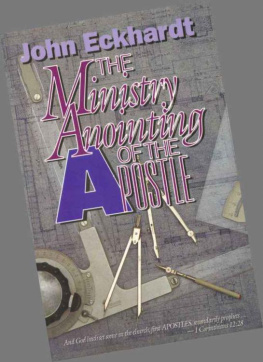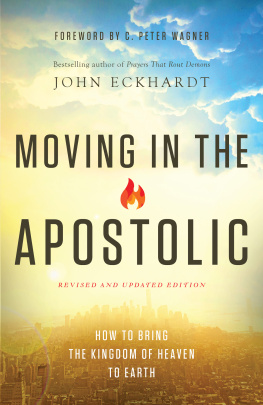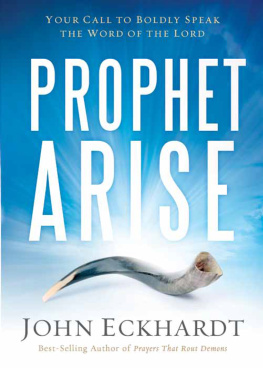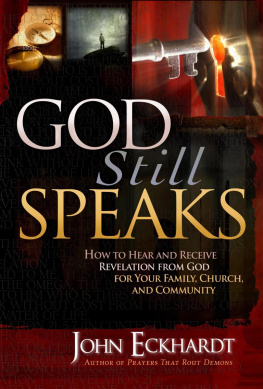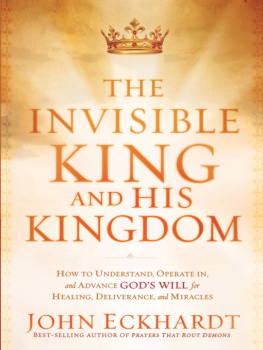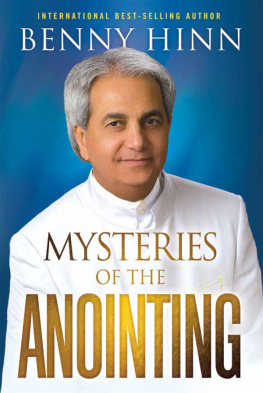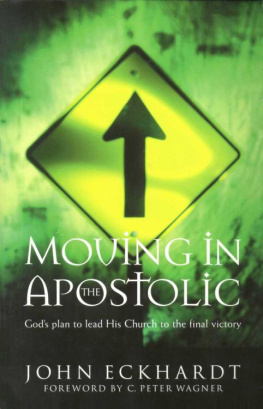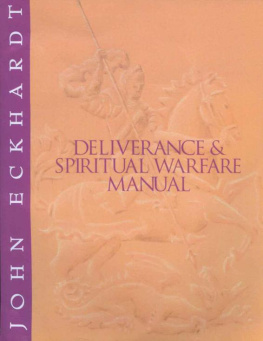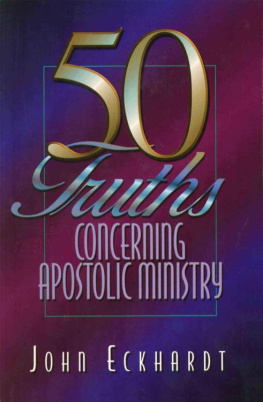John Eckhardt - The ministry anointing of the apostle
Here you can read online John Eckhardt - The ministry anointing of the apostle full text of the book (entire story) in english for free. Download pdf and epub, get meaning, cover and reviews about this ebook. City: Chicago, Ill, year: 1993, publisher: Crusaders Publications, genre: Religion. Description of the work, (preface) as well as reviews are available. Best literature library LitArk.com created for fans of good reading and offers a wide selection of genres:
Romance novel
Science fiction
Adventure
Detective
Science
History
Home and family
Prose
Art
Politics
Computer
Non-fiction
Religion
Business
Children
Humor
Choose a favorite category and find really read worthwhile books. Enjoy immersion in the world of imagination, feel the emotions of the characters or learn something new for yourself, make an fascinating discovery.
- Book:The ministry anointing of the apostle
- Author:
- Publisher:Crusaders Publications
- Genre:
- Year:1993
- City:Chicago, Ill
- Rating:3 / 5
- Favourites:Add to favourites
- Your mark:
- 60
- 1
- 2
- 3
- 4
- 5
The ministry anointing of the apostle: summary, description and annotation
We offer to read an annotation, description, summary or preface (depends on what the author of the book "The ministry anointing of the apostle" wrote himself). If you haven't found the necessary information about the book — write in the comments, we will try to find it.
The ministry anointing of the apostle — read online for free the complete book (whole text) full work
Below is the text of the book, divided by pages. System saving the place of the last page read, allows you to conveniently read the book "The ministry anointing of the apostle" online for free, without having to search again every time where you left off. Put a bookmark, and you can go to the page where you finished reading at any time.
Font size:
Interval:
Bookmark:
Contents
Dedication
T o the memory of Pastor Timothy Longley who helped birth my ministry and was always a dear and encouraging father to me.
John Eckhardt
Chapter 1
The Restoration of the Apostle
And God hath set some in the church, first apostles, secondarily prophets, thirdly teachers, after that miracles , then gifts of healings, helps, governments, diversities of tongues.
1 Corinthians 12:28
So the last shall be first, and the first last: for many be called, but few chosen.
Matthew 20:16
A postles have been set in the church by God, FIRST. The word first is the Greek word proton meaning firstly in time, place, order or importance; before, at the be gin ning, chiefly, first of all. This is God's order: first apostles, secondarily prophets, thirdly teachers. I call this the law of first things. When God says first, He means FIRST. When the church violates this order, we are violating the law of first things.
When you break a law, you will suffer. Many local churches suffer because they have not recognized God's order. A church out of order will not experience the fullness of the anointing. The anointing flows through order. The beginning of the Church started with Apostles. The beginning of the reformation started with Apostles. The beginning of many denominations started with Apostles. When something begins in the right order, it has a better chance of success.
It is amazing how many churches don't recognize this order, although it is plainly stated in the Word of God. It is so simple. First means first, second means second, third means third. It is as easy as one, two, three . Another definition of first is foremost. The w ord foremost means first in a series or progression; of first rank or position. When the office of the Apostle is not recognized as foremost, the Church will end up in serious trouble.
The 20th Century has been a century of divine destiny for the Body of Christ. It has seen a great restoration of the offices and anointing that God has set in the Church. The order of this restoration has been the first restored last, and the last restored first.
The first thing restored to the Church in the beginning of the twentieth century was diversities of tongues. This occurred with the outpouring of the Holy Spirit at Azusa in Los Angeles, California. Helps and governments followed with the establishing and structuring of many Pentecostal fellowships to continue the move of the Holy Spirit.
The 1940s and 1950s saw a restoration of healing and miracles with the evangelist. The restoration of the teacher came in the 1970s. This was followed by a strong move of the prophetic office in the 1980s.
Now, we are seeing restoration of the office of Apostle as we come into the 21st Century. The first office set in the Church by God is the last to be restored in its fullness.
The apostle Peter preached about the times of restitution, spoken of by the prophets since the world began (Acts 3:21). There are seasons in the Spirit in which the Lord magnifies certain offices and their anointings and restores them to the Church. Although all of these anointings have been in operation since the day of Pentecost to some degree, I am referring to the Office being restored in its fullness.
There have always been men who have ministered under the mantle of the Apostle throughout the history of the Church, but the Lord is restoring this office to the Church in such a way that you will see many raised up in the last days to minister as Apostles. The Lord puts honor upon the part of the Body that lacks (1 Corinthians 12:24). The Lord is honoring the office of the Apostle by putting His glory upon it in this hour.
As we honor what God honors, we will receive the blessing and fullness of what the Lord has reserved for this last day Church.
With the restoration of the office of the Apostle, there is coming a restoration of apostolic doctrine, apostolic binding and loosing, apostolic revelation, apostolic governments, and apostolic boldness. According to the prophet Haggai, the glory of the latter house shall be greater than the glory of the former house.
The word apostle is from the Greek word apostolos meaning a delegate, an ambassador of the gospel, officially a commissioner of Christ with miraculous powers. Apostle means one that is sent.
And when he had called unto him his twelve disciples, he gave them power against unclean spirits, to cast them out, and to heal all manner of sickness and all manner of disease.
Now the names of the twelve apostles are these; The first, Simon, who is called Peter, and Andrew his brother; James the son of Zebedee, and John his brother;
Philip, and Bartholomew; Thomas, and Matthew the publican; James the son of Alphaeus , and Lebbaeus , whose surname was Thaddaeus ;
Simon the Canaanite, and Judas Iscariot, who also betrayed him.
These twelve Jesus sent forth, and commanded them, saying, Go not into the way of the Gentiles, and into any city of the Samaritans enter ye not:
Matthew 10:1-5
Notice in verse one the twelve are called disciples, and in verse two they are called apostles. Jesus was entrusting to them His power and authority in sending them forth. An apostle is someone who has been given power against unclean spirits and is sent forth with specific instructions to a certain group of people. Apostles are forerunners. Jesus sent them into cities and areas where He, Himself, would come (Luke 10:1).
They were official representatives of Him, given authority by Him to preach the gospel, heal the sick, and cast out devils. Apostles are ambassadors. An ambassador is an official delegate or representative of a foreign country. They speak for and represent the nation from which they come. They have been given official authority to act in this capacity.
This will give you some idea of the tremendous authority given to the twelve disciples who were sent forth as apostles. Jesus was entrusting to them His power and authority in sending them forth. They were representatives of Christ. The twelve had an awesome responsibility to represent Him correctly as His ambassadors.
The dictionary definition of an ambassador is "an official envoy, a diplomatic agent of the highest rank accredited to a foreign government." A delegate is a person acting for another. A person with delegated authority. The twelve were sent forth as official delegates of Christ with delegated power and authority. The twelve, as a group, really formed an apostolic delegation. This delegation had specific instructions in what to do and what not to do. They had to follow these instructions because they were not representing themselves, but Christ. A delegate does not speak or represent himself but another.
A wicked messenger falleth into mischief: but a faithful ambassador is health.
Proverbs 13:17
As an ambassador, the Apostle has to speak and represent the One who sent himfaithfully. He will bring healing and deliverance with his message. He does not speak his own message, but speaks the message of the One who sent him. A faithful ambassador brings health. There is healing and deliverance in his message.
The apostle Paul embodies this truth when he stated that his message did not come from man, but by the revelation of Jesus Christ (Galatians 1:11-12). He had to be faithful to the message of grace because he received it directly from Jesus. This does not mean that apostles cannot be affected by the doctrines of men. They can be affected by tradition like any other ministry gift.
However, apostles need to be faithful with the message committed to them by the Lord, not man. They are sent by the Lord, not by man. This may cause them to fall out of favor with men, but they must walk in the revelation that they are ambassadors of Christ. The Lord is sending forth apostles that will be faithful to the truth and not to the false teachings of men.
Font size:
Interval:
Bookmark:
Similar books «The ministry anointing of the apostle»
Look at similar books to The ministry anointing of the apostle. We have selected literature similar in name and meaning in the hope of providing readers with more options to find new, interesting, not yet read works.
Discussion, reviews of the book The ministry anointing of the apostle and just readers' own opinions. Leave your comments, write what you think about the work, its meaning or the main characters. Specify what exactly you liked and what you didn't like, and why you think so.

